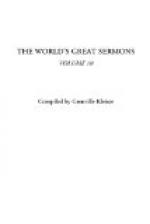How different all this is from the atmosphere of the modern Church. When you go into the average church to-day, what great idea meets you? Do you find yourselves face to face with the fact that Christ died for our sins? I do not think you will often hear that great truth preached. In all probability you will hear a sermon dealing with the domestic graces, or with business obligations, or with political duties and complications. You may hear a sermon on city missions, or on foreign missions; you may hear a man dealing with some great evil, or pointing out some alarming danger, or discussing some interesting social problem, or urging upon men’s consciences the performance of some duty. It is not often in these modern days that you will hear a sermon dealing with the thought that set the apostles blazing and turned the world upside down. And right there, I think, lies one of the causes of the weaknesses of the modern Church. We have been so busy attending to the things that ought to be done, we have had no time to feed the springs that keep alive these mighty hopes which make us Christian men. What is the secret of the strength of the Roman Catholic Church? How is it that she pursues her conquering way, in spite of stupidities and blunders that would have killed any other institution? I know the explanations that are usually offered, but it seems to me they are far from adequate. Somebody says, But the Roman Catholic Church does not hold any but the ignorant. That is not true. It may be true of certain localities in America, but it is not true of the nations across the sea. In Europe she holds entire nations in the hollow of her hand; not only the ignorant, but the learned; not only the low, but the high; not only the rude, but the cultured, the noble, and the mighty. It will not do to say that the Roman Catholic Church holds nobody but the ignorant. But even if it were true, it would still be interesting to ascertain how she exercises such an influence over the minds and hearts of ignorant people—for ignorant people are the hardest of all to hold. When you say that the Church can hold ignorant men, you are giving her the very highest compliment, for you are acknowledging that she is in the possession of a power which demands an explanation. The very fact that she is able to bring out such hosts of wage-earning men and women in the early hours of Sunday morning, men and women who have worked hard through the week, and many of them far into the night, but who are willing




